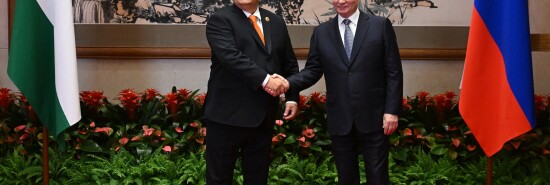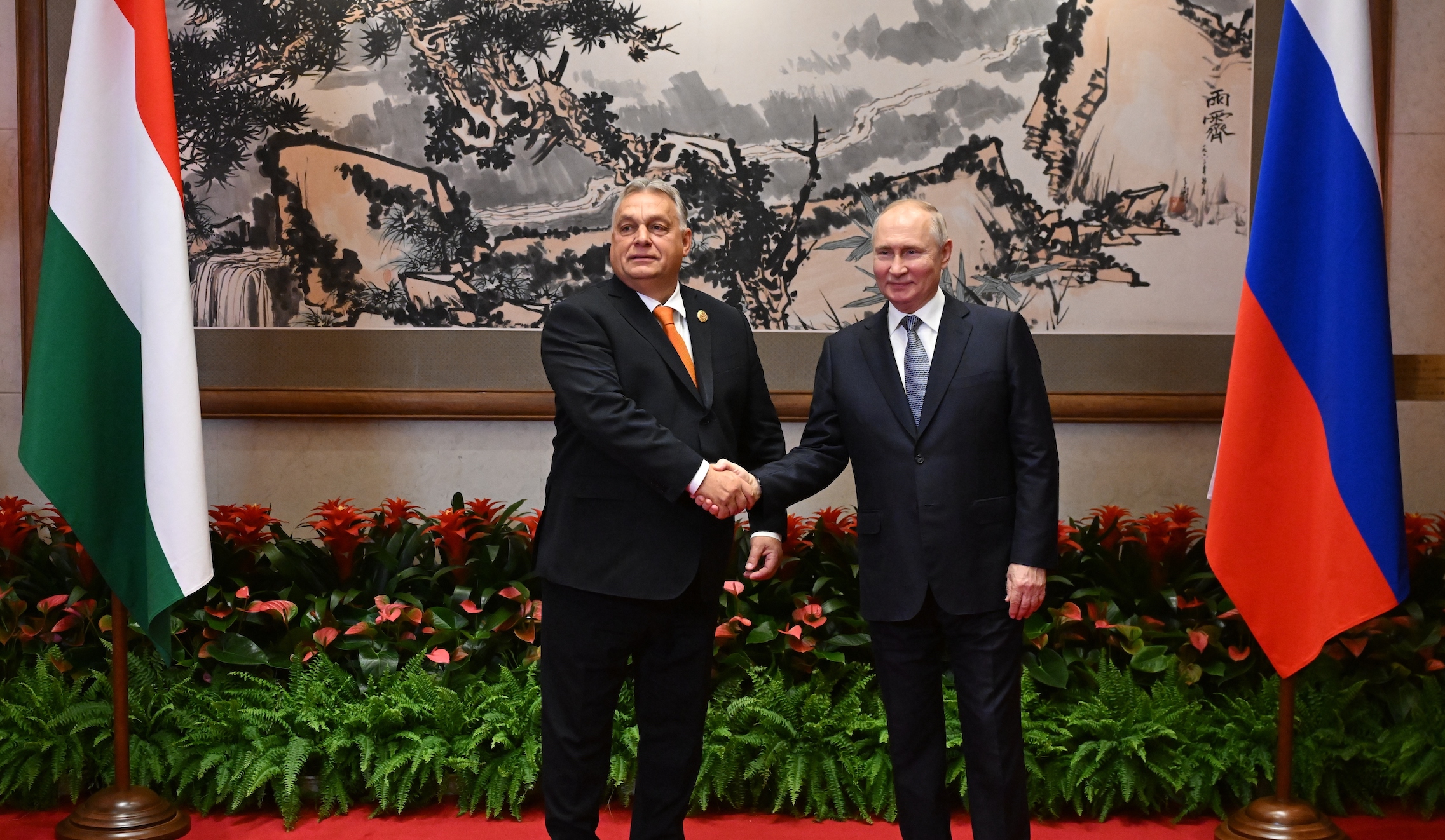
Putin meets Viktor Orban in China ahead of Xi visit as Hungary deepens rift with NATO allies
Joel Gehrke
Video Embed
Russian President Vladimir Putin met with Hungarian Prime Minister Viktor Orban in China at the outset of a two-day trip to celebrate one of Xi Jinping’s signature strategic initiatives.
“We are happy to meet with you here, on the sidelines of the international forum in Beijing,” Putin said Tuesday. “We are happy to have this meeting, which, I am sure, will be positive. Thank you.”
ISRAEL-HAMAS WAR RISKS UPENDING TRADE AND COMMODITIES SHIPPING
Orban posed for a handshake with Putin, the scene and the setting offering a timely reminder of Hungary’s cozy relationship with authoritarian governments hostile to NATO. The encounter provided Putin with a rare photo-op with a Western leader, whom most trans-Atlantic heads of state regard as a pariah due to Russia’s invasion of Ukraine, which Orban referred to as a mere “military operation” while he lamented how the war has complicated his economic and foreign policy priorities.
“Hungary has never wanted to stand against Russia. On the contrary, its goal has always been to build and expand the best mutual contacts,” Orban told Putin, per the Kremlin transcript, before expressing gratitude for their energy industry cooperation. “This helped us save much of what we have achieved together. Nobody likes it when the results of their work are rendered null through no fault of theirs.”

His performance drew rebuke from the top U.S. diplomat in Budapest. “Hungary’s leader chooses to stand with a man whose forces are responsible for crimes against humanity in Ukraine, and alone among our Allies,” Ambassador David Pressman wrote on social media. “While Russia strikes Ukrainian civilians, Hungary pleads for business deals.”
That rebuke angered Orban’s team. “If the question is who’s doing business with the Russians, the Americans should turn down the volume,” the Hungarian leader’s political director, Balazs Orban, wrote on X, the social media company formerly known as Twitter. “They are buying more than twice as much nuclear fuel alone as they used to, and we have a whole list of them. We are fed up with [the US ambassador’s] hypocrisy!”
Hungarian officials have long cited the example of companies from larger Western countries to justify their resistance to the warnings the United States has sent about Hungary’s relationship with China and Russia. The division has deepened since Putin launched his attempt to overthrow the Ukrainian government and the International Criminal Court issued a warrant for his arrest for war crimes.
“It’s outrageous [for Viktor Orban] to meet Putin, who was recognized as a war criminal,” Ukrainian Foreign Affairs Committee Chairman Oleksandr Merezhko told the Washington Examiner, noting that Hungary has signed a treaty obligating the government to arrest Putin on behalf of the ICC if he enters the country. “It’s like [as if it were] during Second World War, for one of the member of anti-Germany, anti-Nazi coalition to meet Hitler, the same story. … So it’s outrageous, and it’s like betrayal of all values of all values of European Union, NATO.”
Viktor Orban, for his part, made clear to Putin that he wants an immediate halt to the fighting in Ukraine — a ceasefire that Moscow also desires but Ukrainian leaders have rejected because they want to continue the attempt to liberate the territory occupied by Russian forces.
“Everyone in Europe is asking the same thing: can there be a ceasefire in Ukraine? It’s crucial for Europe, including Hungary, that the flood of refugees, sanctions and fighting should end!” Hungary’s prime minister wrote on X while publishing a photo of himself with Putin.
The leaders are in Beijing to mark the 10th anniversary of the Belt and Road Initiative, an overseas infrastructure investment project that Xi has used to gain control over strategically valuable infrastructure around the world. Though travel-shy since the beginning of the pandemic and the full-scale war, Putin made the trek to Beijing just days after a trip to Kyrgyzstan, which hosted a summit of leaders from countries that used to be part of the Soviet Union.
“Ideally, Putin would want big raw materials contracts, but they won’t happen now. Because any optics that contracts with China provide new sources of income to Putin’s military treasury is bad for China,” Alexander Gabuev, the director of the Carnegie Russia Eurasia Center, told the Moscow Times. “And China is in a position not to do it even if the Russians really want it.”
Putin touted his impending meeting with Xi, which is scheduled for Wednesday, as an opportunity to coordinate economic activities under a wider goal of diminishing the power of the U.S. and its allies.
“The main advantage of the concept of cooperation proposed by the Chinese side is that nobody imposes anything on anybody in the framework of this work,” Putin told China Media Group. “In my view, this is what distinguishes the Belt and Road Initiative proposed by the Chinese president from many others that countries with a heavy colonial legacy are trying to implement in the world.”
CLICK HERE TO READ MORE FROM THE WASHINGTON EXAMINER
The meeting with Viktor Orban gave him an opportunity to strike a similar note with the leader of a member of NATO.
“Even though our opportunities to maintain contacts and develop relations are limited due to the current geopolitical situation, it is satisfying that we maintain and develop relations with many countries in Europe,” Putin said Tuesday. “We know that our positions are not always aligned, but I believe it is extremely important that we have the opportunity to exchange opinions.”
